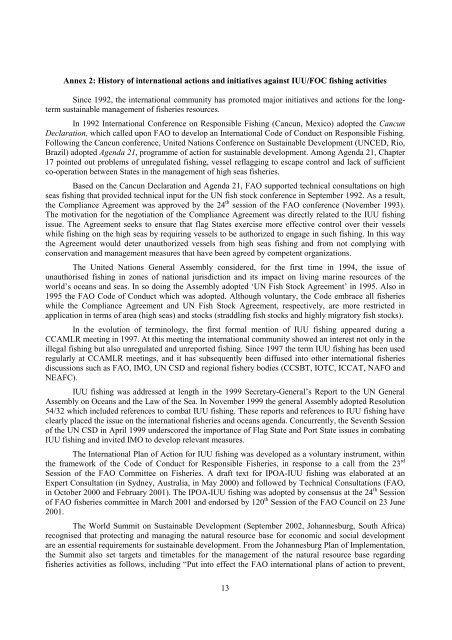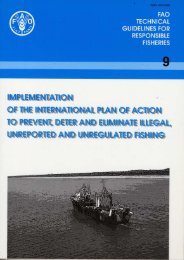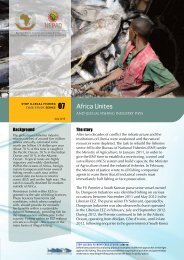1 Addressing Illegal, Unreported and Unregulated (IUU ... - OECD
1 Addressing Illegal, Unreported and Unregulated (IUU ... - OECD
1 Addressing Illegal, Unreported and Unregulated (IUU ... - OECD
You also want an ePaper? Increase the reach of your titles
YUMPU automatically turns print PDFs into web optimized ePapers that Google loves.
Annex 2: History of international actions <strong>and</strong> initiatives against <strong>IUU</strong>/FOC fishing activitiesSince 1992, the international community has promoted major initiatives <strong>and</strong> actions for the longtermsustainable management of fisheries resources.In 1992 International Conference on Responsible Fishing (Cancun, Mexico) adopted the CancunDeclaration, which called upon FAO to develop an International Code of Conduct on Responsible Fishing.Following the Cancun conference, United Nations Conference on Sustainable Development (UNCED, Rio,Brazil) adopted Agenda 21, programme of action for sustainable development. Among Agenda 21, Chapter17 pointed out problems of unregulated fishing, vessel reflagging to escape control <strong>and</strong> lack of sufficientco-operation between States in the management of high seas fisheries.Based on the Cancun Declaration <strong>and</strong> Agenda 21, FAO supported technical consultations on highseas fishing that provided technical input for the UN fish stock conference in September 1992. As a result,the Compliance Agreement was approved by the 24 th session of the FAO conference (November 1993).The motivation for the negotiation of the Compliance Agreement was directly related to the <strong>IUU</strong> fishingissue. The Agreement seeks to ensure that flag States exercise more effective control over their vesselswhile fishing on the high seas by requiring vessels to be authorized to engage in such fishing. In this waythe Agreement would deter unauthorized vessels from high seas fishing <strong>and</strong> from not complying withconservation <strong>and</strong> management measures that have been agreed by competent organizations.The United Nations General Assembly considered, for the first time in 1994, the issue ofunauthorised fishing in zones of national jurisdiction <strong>and</strong> its impact on living marine resources of theworld’s oceans <strong>and</strong> seas. In so doing the Assembly adopted ‘UN Fish Stock Agreement’ in 1995. Also in1995 the FAO Code of Conduct which was adopted. Although voluntary, the Code embrace all fisherieswhile the Compliance Agreement <strong>and</strong> UN Fish Stock Agreement, respectively, are more restricted inapplication in terms of area (high seas) <strong>and</strong> stocks (straddling fish stocks <strong>and</strong> highly migratory fish stocks).In the evolution of terminology, the first formal mention of <strong>IUU</strong> fishing appeared during aCCAMLR meeting in 1997. At this meeting the international community showed an interest not only in theillegal fishing but also unregulated <strong>and</strong> unreported fishing. Since 1997 the term <strong>IUU</strong> fishing has been usedregularly at CCAMLR meetings, <strong>and</strong> it has subsequently been diffused into other international fisheriesdiscussions such as FAO, IMO, UN CSD <strong>and</strong> regional fishery bodies (CCSBT, IOTC, ICCAT, NAFO <strong>and</strong>NEAFC).<strong>IUU</strong> fishing was addressed at length in the 1999 Secretary-General’s Report to the UN GeneralAssembly on Oceans <strong>and</strong> the Law of the Sea. In November 1999 the general Assembly adopted Resolution54/32 which included references to combat <strong>IUU</strong> fishing. These reports <strong>and</strong> references to <strong>IUU</strong> fishing haveclearly placed the issue on the international fisheries <strong>and</strong> oceans agenda. Concurrently, the Seventh Sessionof the UN CSD in April 1999 underscored the importance of Flag State <strong>and</strong> Port State issues in combating<strong>IUU</strong> fishing <strong>and</strong> invited IMO to develop relevant measures.The International Plan of Action for <strong>IUU</strong> fishing was developed as a voluntary instrument, withinthe framework of the Code of Conduct for Responsible Fisheries, in response to a call from the 23 rdSession of the FAO Committee on Fisheries. A draft text for IPOA-<strong>IUU</strong> fishing was elaborated at anExpert Consultation (in Sydney, Australia, in May 2000) <strong>and</strong> followed by Technical Consultations (FAO,in October 2000 <strong>and</strong> February 2001). The IPOA-<strong>IUU</strong> fishing was adopted by consensus at the 24 th Sessionof FAO fisheries committee in March 2001 <strong>and</strong> endorsed by 120 th Session of the FAO Council on 23 June2001.The World Summit on Sustainable Development (September 2002, Johannesburg, South Africa)recognised that protecting <strong>and</strong> managing the natural resource base for economic <strong>and</strong> social developmentare an essential requirements for sustainable development. From the Johannesburg Plan of Implementation,the Summit also set targets <strong>and</strong> timetables for the management of the natural resource base regardingfisheries activities as follows, including “Put into effect the FAO international plans of action to prevent,13
















